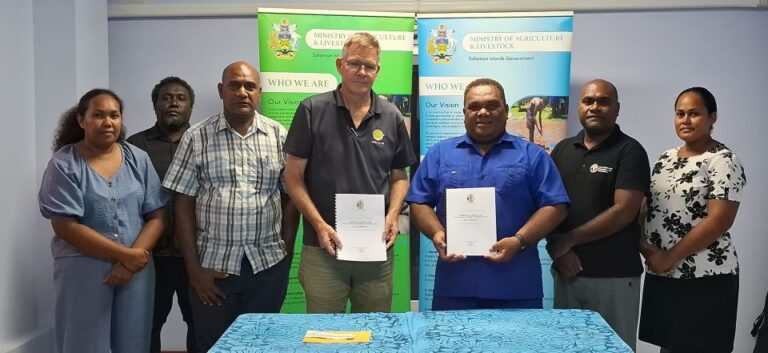THE European Union has pledged to support the Bina Harbour Tuna Processing Plant project, aligning with the Solomon Islands Government’s push for transformative economic infrastructure development.
This is one of the key outcomes following a meeting between the Minister for National Planning and Development Coordination (MNPDC) Hon. Rexon Ramofafia and the EU’s newly designated Ambassador to the Solomon Islands, Her Excellency Ms. Barbara Plinkert, on Thursday October 31st in Honiara.
“The Bina Harbour project is also recognized as a priority, although it remains in the preparatory phase. We are more than willing to jump in and support its preparation and operational stages, especially considering the government’s aim for transformative investments in economic infrastructure,” Her Excellency Plinkert said in response to Minister Ramofafia.
During the meeting, Minister Ramofafia Request EU to support the Bina Harbour Tuna Processing Plant project as it aligns with Solomon Islands preparation to graduate from Least Developed Country (LDC) status.
“Bina is among the government’s top priorities, and we aim to see the project launched before 2027. This priority was emphasized at a recent roundtable meeting with development partners, and further funding discussions could help align our objectives,” Hon. Ramofafia said.

He said Bina Harbour Tuna project will be the country’s second major tuna processing plant project – besides Noro, and the Government is exploring alternative financing methods for the project, including concessional loans.
“With the EU being a significant importer of our tuna products, this project holds strategic importance for us, particularly given that it targets one of the Solomon Islands’ largest provinces.”
The Minister stressed that the Government is exploring alternative financing methods for priority projects, including both grants and concessional loans.
“We welcome further discussions on these matters and are keen to collaborate with the EU in ways that align with our national priorities and fiscal goals,” the Minister adds. Minister Ramofafia stressed that EU grant financing of €9 million available to Solomon Islands should be refocused on the Bina Harbour Tuna Processing Project in particular for the public infrastructure component.
Her Excellency Ms Plinkert acknowledged the informative discussions she had with Minister Ramofafia and his Permanent Secretary Dr Melchior Mataki and highlighted that her team has taken careful note of the sectors and projects mentioned.
“When it comes to combining concessional loans with grants, this would involve close cooperation with the Directorate of Investment and Promotion (DIP). Our colleagues will confirm the envelope available to support the initiatives discussed, and we hope to share these figures soon,” she said.
H.E Plinkert adds, with this approach, the EU hope to support both immediate and long-term needs for infrastructure and economic growth in the Solomon Islands.
Minister Ramofafia thanked the EU for its steadfast support and welcomed the prospect of additional funding for critical infrastructure projects, particularly the Bina Harbour Tuna Processing Plant which he reiterated as a strategic priority for economic growth and an essential component of Solomon Islands’ LDC graduation strategy.
“We look forward to expanding our partnership with the EU, whose investments play a vital role in supporting our country’s aspirations for sustainable development and economic resilience,” stated Minister Ramofafia.
The Bina Harbour development will require major investment to the tune US$200 million for the port facility, associated infrastructure and utilities.
When operational, it is forecasted to add around USD 400 million over 15 years in economic benefits from the estimated cash flows to the government, salaried workers, the processing plant operator, and the fishing vessel operating company.
Source: MNPDC Press Release




